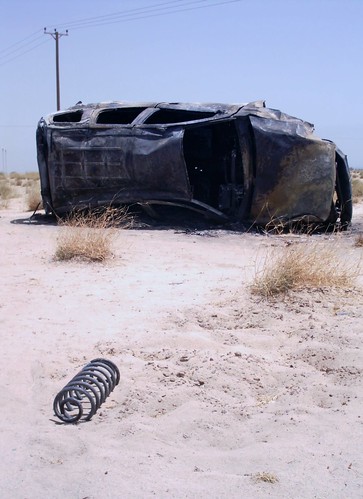Our civilization is fast approaching a tipping point. Humans will need to make the transition from nonrenewable fossil fuels as the primary source of our energy to renewable energy sources that will allow us to flourish into the future. Failure to make that transformation will doom us to the endless political machinations and economic conflicts that have plagued civilization for the last half-millennium.Pure comedy gold..., a little later during the 1970's - the U.S. had a SINGULAR opportunity under the leadership of James Earl Carter to ATTEMPT this transition. Unfortunately for the species, that was the road not taken. Instead, *we* replaced Carter with old triple 6 - and stayed on the imperial path of ruination that has dominated human affairs for 6000 years.
We need new technologies to be sure, but without evolved political and economic systems, we cannot become what we must. And what is that? A Type 1 civilization. Let me explain.
In a 1964 article on searching for extraterrestrial civilizations, the Soviet astronomer Nikolai Kardashev suggested using radio telescopes to detect energy signals from other solar systems in which there might be civilizations of three levels of advancement: Type 1 can harness all of the energy of its home planet; Type 2 can harvest all of the power of its sun; and Type 3 can master the energy from its entire galaxy.
Based on our energy efficiency at the time, in 1973 the astronomer Carl Sagan estimated that Earth represented a Type 0.7 civilization on a Type 0 to Type 1 scale. (More current assessments put us at 0.72.) As the Kardashevian scale is logarithmic -- where any increase in power consumption requires a huge leap in power production -- we have a ways before 1.0.
Fossil fuels won't get us there. Renewable sources such as solar, wind and geothermal are a good start, and coupled to nuclear power could eventually get us to Type 1.He's right as far as he goes, the problem is that he doesn't go nearly far enough. It's not merely a question of political will and economic opportunity that will bring about the end of this species in the 3rd terrestrial species die-off, rather, it's the total lack of psychological evolution that has maintained an objectively evil status quo baseline in the dominant systems of human governance. Unevolved creatures don't spontaneously generate or sustain evolved systems of governance and evolved social orders, no more than turnips generate blood. Is common sense THAT sorely lacking?
Yet the hurdles are not solely -- or even primarily -- technological ones. We have a proven track record of achieving remarkable scientific solutions to survival problems -- as long as there is the political will and economic opportunities that allow the solutions to flourish. In other words, we need a Type 1 polity and economy, along with the technology, in order to become a Type 1 civilization.
For thousands of years, we have existed in a zero-sum tribal world in which a gain for one tribe, state or nation meant a loss for another tribe, state or nation -- and our political and economic systems have been designed for use in that win-lose world. But we have the opportunity to live in a win-win world and become a Type 1 civilization by spreading liberal democracy and free trade, in which the scientific and technological benefits will flourish. I am optimistic because in the evolutionist's deep time and the historian's long view, the trend lines toward achieving Type 1 status tick inexorably upward.This part he gets right, except for the ridiculously optimistic conclusion. We have existed in and have been utterly and completely conditioned by a zero-sum tribal world. We will as a species die-off because of that de-evolutionary psychosocial condition. The problem as stated by this new-age wishful thinker is merely political. I cut him off at the knees for his superficiality, others wouldn't have even given this silly and ill-informed screed the time of day, to wit;
That is change we can believe in.
In the past few centuries the elites have gained a new method of growth conquest. The lever of Science/technology has been used to further their power. Through the creation of industrialism, we now live in a manufactured environment. We civilized people have created machines and been conditioned by the machine world until we begin to act in a machine-like manner. Powerless, we are thoroughly dependent upon the machine for our food and shelter survival. Alienated and atomized, we move around trying to fit into a niche in order to obtain survival. The pressure to move to a job breaks nuclear families apart and certainly precludes the existence of extended families. We have become interchangeable ciphers in the industrial machine. We have been culturally conditioned from birth to have great regard for non-living manufactured items and have been alienated from living things. We have more regard for the dead wood of a church! than for a living forest.From where I sit, that's what looks really real. Be hopeful all you want, hopeful but fully informed. Otherwise, from a simple information awareness perspective, your situation is indeed entirely hopeless.
Today, when we look at the numbers and look back at those millions of acres of exhausted and eroded soils, common sense tells us that this is the end. The Patriarchs of empire have committed us to a fundamental biological error. Any organism that wantonly kills that which feeds it will not endure very long. The culture of empire does not have a political problem; it has a biological problem. It lives in a bubble of self-created definitions and has a dysfunctional relationship with the life of the earth. One might say that if the humans can't keep the planet alive, they certainly can't live here.

































